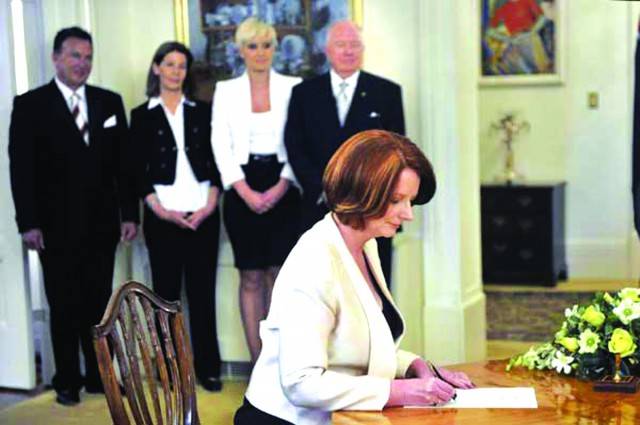
This photograph shows Julia Gillard signing her commission during her swearing-in ceremony at the Government House Canberra in 2010.
Gillard was joined by partner Tim Mathieson, and some of her front-bench colleagues including Treasurer Wayne Swan.
Born in Barry, Wales, Gillard migrated with her family to Adelaide in South Australia in 1966. She attended Mitcham Demonstration School and Unley High School. Gillard went on to study at the University of Adelaide, but switched to the University of Melbourne in 1982, where she graduated with a Bachelor of Laws in 1986 and a Bachelor of Arts in 1989. During this time, she was President of the Australian Union of Students from 1983 to 1984. In 1987, Gillard joined the law firm Slater & Gordon, eventually becoming a partner in 1990, specialising in industrial law. In 1996, she became Chief of Staff to John Brumby, the Leader of the Opposition in Victoria.
Gillard was first elected to the House of Representatives at the 1998 election for the seat of Lalor. Following the 2001 election, she was appointed to the Shadow Cabinet. In December 2006, Gillard became the running mate of Kevin Rudd in a successful leadership challenge to Kim Beazley, becoming Deputy Leader of the Opposition. After Labor’s victory at the 2007 election, she was appointed as Deputy Prime Minister of Australia, and was also given the roles of Minister for Education, Minister for Employment and Workplace Relations, and Minister for Social Inclusion.
On 24 June 2010, after Rudd lost internal support within the Labor Party and resigned as leader, Gillard was elected unopposed as his replacement, and was sworn-in as Prime Minister. She led Labor through the 2010 election weeks later, which saw the first hung parliament since 1940. Gillard was able to form a minority government with the support of a Green MP and three independents. The Gillard Government introduced the National Disability Insurance Scheme, introduced Gonski funding for Australian education, implemented the carbon pricing in Australia, and oversaw the National Broadband Network. On 26 June 2013, after a lengthy period of leadership instability, Gillard lost the leadership of the Labor Party back to Rudd at a leadership spill. Her resignation as Prime Minister took effect the next day, and she announced her retirement from politics.


